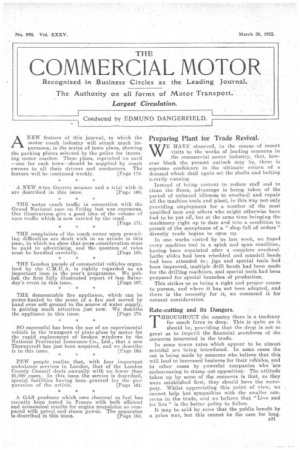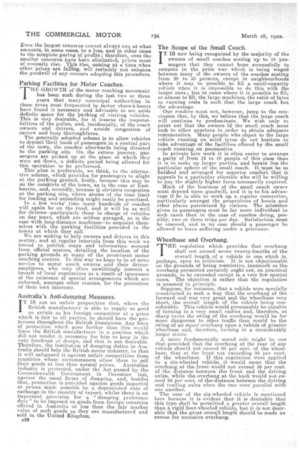Preparing Plant for Trade Revival . .
Page 1

Page 2

If you've noticed an error in this article please click here to report it so we can fix it.
E HAVE observed, in the course of recent visits to the works of leading concerns in the commercial motor industry, that, however black the present outlook may be, there is supreme confidence in the ultimate return of a demand which shall again set the shafts and belting merrily running. Instead of being content to reduce staff and to clean the floors, advantage is being taken of the period of enforced idleness to overhaul and repair all the machine tools and plant, in this way not only providing employment for a, number of the most qualified mon and others who might otherwise have had to be put off, hut at the same time bringing the machinery right up to date arid into a condition to permit of the acceptance of a "shop full of orders" directly trade begins to open up. In one works visited by us last week, we found every machine tool in a spick and span condition, having been repainted after a complete overhaul. Lathe slides had been rebedded and mandril heads had been attended to ; jigs and special tools had been improved, multiple drill heads had been made for the drilling machines, and special tools had been prepared for special branches of production. This strikes us as being a right and proper course to pursue, and where it has not been adopted, and there is the necessity for it, we commend it for earnest consideration.
Rate-cutting and its Dangers. THROUGHOUT the country there is a tendency for coach fares to drop. This is quite as it should be, providing that the drop is not so great as to imperil the financial soundness of the concerns interested in the trade.
In some towns rates which appear to be almost suicidal are being introduced. In some cases the cut is being made by concerns who believe that this will lead to increased business for their vehicles, and in other cases by powerful companies who 'are endeavouring to stamp out opposition. The attitude taken up by some of the concerns is that, as they were established first, they should have the monopoly. Whilst appreciating this point of view, we cannot help but sympathize with the smaller concerns in the trade, and we believe that "Live and let live" is the better policy to follow. It may be said by some that the public benefit by a price war, but this cannot be the case for long. A31 Even the largest concerns eennot alwaye run at what amounts, in some came, to a loss, and in other cases to the complete paring of profits ; therefore, once the smaller concerns have be eliminated, prices must of necessity rise. This riag, coming at a time when other prices are falling, will certainly not enhance the goodwill of any concern adopting this procedure.
Parking Facilities for Motor Coaches.
THE GROWTH of the motor coaching movement has been such. during the last two or three years that many municipal authorities in those areas most frequented by motor chars-a-banes have found it necessary and advisable to set aside definite space for the parking of visiting vehicles. This is very desirable, for it lessens the responsibilities of the police, and, incidentally, of the coach owners and drivers, and avoids congestion of narrow and busy thoroughfares. The generally adopted scheme is to allow vehicles to deposit their loads of passengers in a central part of the town, the coaches afterwards being directed to the parking site. On the return journey, passengers are picked up at the place at which they were sot clown, a definite period being allowed for this operation to be performed.
This plan is preferable, we think, to the alternative scheme, which provides for passengers to alight at the parking ground, firstly, because this may be on the outskirts of the town, as is the case at Lastbourne, and, secondly, 'because it obviates congestion at the parking site, where abuses of the time limit for loading and unloading might easily be practised. In a few weeks' time many hundreds of coaches will again be on the road, and it will be as well for drivers—particularly those in charge of vehicles on day tours, which are seldom garaged, as is the case with long-distance machines—to acquaint themselves with the parking facilities provided in the towns at which they call. We are seeking to help owners and drivers in this matter, and at regular intervals from this week we intend to publish maps and information secured from official sources, detailing the location of the parking grounds at many of the prominent motor coaching centres. In this way we hope to be of some service to motor coach owners and their driveremployees, who very often unwittingly commit a breach of local regulations as a result of ignorance of the existence of special arrangements which are enforced, amongst other reasons, for the protection of their own interests.
Australia's Anti-dumping Measures.
IT IS not an unfair proposition that, where the British manufacturer is able to supply as good an article as his foreign competitor at a price which is fair to all parties, he should have the preference throughout the British Dominions. Any form of protection which goes further than this would leave the British manufacturer in a position which did not render it necessary for him to keep in the very forefront of design, and that is not desirable. Therefore, the institution of dumping duties in Australia should help the British motor industry, in that it will safeguard it against unfair competition froni countries whose circumstances allow them to sell their goods at less than normal prices. Australian industry is protected, under the Act passed by the Commonwealth Government in December last, against the usual forms of dumping, and, besides that, protection is provided against goods imported at prices made possible by a depreciated rate of exchange in the country of export, whilst there is an important provision for a "dumping preference duty" to be im,posed on goods from foreign countries offered in Australia at less than the fair market value of such goods as they are manufactured and sold in the United Kingdom.
A32
The Scope of the Small Coach.
IT IS now being recognized by the majority of the owners of small coaches seating up to 18 passengers that they cannot hope successfully to compete in the price war which is being waged between many af the owners of the coaches seating from 28 to 33 persons, except in neighbourhoods where it may be possible to fill a small-capacity vehicle when it is impossible to do this with the larger ones ; but in cases where it is possible to fill, or almost to fill, the large machines, the ratio of fares to running costs is such that the large coach has the advantage.
Our readers must not, however, jump to the conclusion that, by this, we believe that the large coach will continue to predominate. We wish only to point out that the owners of the small coach must look to other quarters in order to obtain adequate remuneration. Many people who object to the large vehicle running on solid tyres do not hesitate to take advantage of the facilities offered by the small coach running on pneumatics. In private hire work it is often easier to arrange a party of from 12 to 18 people of this class than it is to make up larger parties, and herein lies the particular sphere of the small coach. It must be so finished and arranged for superior comfort that it appeals to a particular clientele who will be willing to pay the slightly higher fares necessarily required. Much of the business of the small ooach owner must depend upon goodwill, and it is to his advantage if he is able to work up a regular connection, particularly amongst the proprietors of hotels and other places patronized by visitors. The attention given to passengers must be far more individual in such cases than in the case of coaohes doing, possibly, two or three trips per day. Satisfaction must be ensured, and in no ease should a passenger be allowed to leave suffering under a grievance.
Wheelbase and Overhang.
THE regulation which provides that overhang shall not exceedseven twenty-fourths of the overall length of a vehicle is one which is, perhaps, open to criticism. It is not objectionable on the grounds of being restrictive, inasmuch as the overhang permitted certainly ought not, on practical grounds, to be exceeded except in a very few special cases. The objection is rather that the regulation is unsound in principle.
Suppose, for instance, that a vehicle were specially constructed in such a way that the overhang of the forward end was very great and the wheelbase very short, the overall length of the vehicle being considerable. This vehicle would presumably be capable of turning in a very small radius and, therefore, at sharp turns the swing ef the overhang would be far more dangerous to other traffic than would be the swing of an equal overhang upon a vehicle of greater wheelbase and, therefore, turning in a considerably larger circle. A more fundamentally sound rule might be one that provided that the overhang at the rear of any vehicle should not exceed CO per cent. of the wheelbase, that at the front not exceeding 30 per cent. of the wheelbase. If this regulation were applied to a six-wheeled vehicle, it would mean that the overhang at the front would not exceed 30 per cent. of the distance between -the front and the driving axles, while the overhang at the back would not exceed 60 per cent. of the-distance between the driving and trailing axles when the two were parallel with one another. a The case of the six-wheeled vehicle is mentioned here because it is evident that it is desirable that this type shell be permitted a greater ovetall length than a rigid four-wheeled vehicle, but it -is not. desirable that the great overall length should be made an excuse for excessive overhang.
































